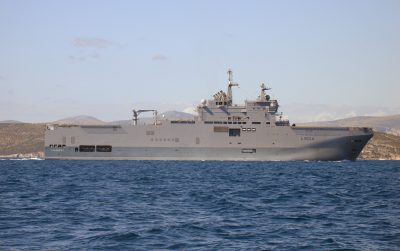France Increases Hostilities Against China in the South China Sea

All Global Research articles can be read in 27 languages by activating the “Translate Website” drop down menu on the top banner of our home page (Desktop version).
***
The French Navy days ago announced that the Tonnerre amphibious assault ship and the Surcouf frigate departed from the port of Toulon on February 18 and would travel to the Pacific for a three-month mission. According to Naval News, the French warships will pass through the South China Sea twice and in May participate in joint military exercises with the U.S., Australia, India and Japan. China has strongly criticized this French move.
The fact that the French Navy sent the Surcouf and the multi-purpose landing craft Tonnere to patrol the South China Sea, which is over 10,000 kilometers away from France, proves that the disputed sea region is one of the most important geopolitical hotspots in the world. The French claim that attention is focused on ensuring navigational security as the South China Sea is a particularly important bridge between the Indian and Pacific Oceans, and has influence on geopolitics and geoeconomics, not only within Asia-Pacific and the Indo-Pacific region, but for the entire world.
By sending modern warships to Asia-Pacific, France proved that they have a new approach to Vietnam, a former French colony. The recent moves by Paris marks the return of the French to Southeast Asia, not as an invader like in the previous century, but as a country willing to challenge and provoke China in its own backyard. This is something that would also appeal to Vietnam as it has centuries long enmity with China that continues to this day and is far deeper compared to the relatively short-lived French colonial era of Indochina. Another point to note is that the French energy company Total is one of the most important partners for Vietnam in the oil and gas sector. The French company is currently cooperating with Vietnam and some other countries in the region to exploit resources.
Since 2018, France has built an Indo-Pacific strategy. France is the first European country to make this move. In addition, in 2015 and 2017, French warships also passed through the South China Sea. It is likely that France will now step up its position against Beijing’s claims in the South China Sea by increasing the frequency of its activities in the region, including military exercises.
Four permanent members of the United Nations Security Council send their fleets on irregular or periodic patrols in the South China Sea, proving how important this region is for the global economy and the world’s superpowers. It should be emphasized that having a major power from outside the region deploy its modern weapons in the South China Sea is a major provocation. France, whose closest territory to the South China Sea is New Caledonia over 6,500 kilometers away, has no business in being involved in the region’s problems. But none-the-less, the French are most likely motivated to be interested in South China Sea affairs to support Total’s business plans in the area.
In the words of French Defense Minister Florence Parly, the patrol of French warships in the South China Sea is “evidence of the French navy’s ability to deploy operations in remote areas in the long run with strategic partners,” making reference to the U.S., Japan and Australia. It can be seen that France is ready to strengthen cooperation with QUAD, a coalition consisting of the U.S., India, Japan and Australia whose aim is to challenge China in the Indo-Pacific region.
France is not a member of QUAD; however, the European country can strengthen its ties with the alliance on the basis of bilateral military agreements signed with the U.S. and the other three countries. On the other hand, France is an ally of the U.S. through NATO, in which Japan and Australia are also considered Major non-NATO allies. The dispatch of two important warships to the South China Sea shows that France is ready to stand alongside the U.S., Japan, India and Australia in Indo-Pacific geostrategic, political and military issues with a focus against China.
For the U.S., the introduction of French warships to the South China Sea is an important step towards establishing an anti-China alliance on a global scale, not just at a regional level. Although China has denounced these recent provocations emanating from non-regional powers, it has not yet revealed how they may respond.
Although the French Colonial Empire is long gone, Paris is still attempting to maintain its global influence through its former colonies, not only in Southeast Asia through countries like Vietnam, but also in Africa, the South Pacific, South America and the Caribbean. However, despite France’s antagonizations, Paris does not have the capabilities to be able to challenge China unilaterally in the South China Sea, hence why it is relying on former colonial possessions like Vietnam and partners like the U.S., Australia and India. For now, there is no indication that France will successfully deter China from pursuing its interests in the South China Sea.
*
Note to readers: please click the share buttons above or below. Forward this article to your email lists. Crosspost on your blog site, internet forums. etc.
This article was originally published on InfoBrics.
Paul Antonopoulos is an independent geopolitical analyst.
Featured image is from Wikimedia Commons

